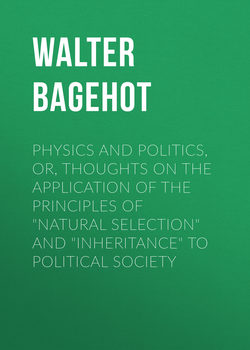Physics and Politics, or, Thoughts on the application of the principles of "natural selection" and "inheritance" to political society

Реклама. ООО «ЛитРес», ИНН: 7719571260.
Оглавление
Walter Bagehot. Physics and Politics, or, Thoughts on the application of the principles of "natural selection" and "inheritance" to political society
NO. I. THE PRELIMINARY AGE
II
III
IV
NO. II. THE USE OF CONFLICT
II
III
NO. III. NATION-MAKING
NO. IV. NATION-MAKING
NO. V. THE AGE OF DISCUSSION
II
NO. VI. VERIFIABLE PROGRESS POLITICALLY CONSIDERED
Отрывок из книги
One peculiarity of this age is the sudden acquisition of much physical knowledge. There is scarcely a department of science or art which is the same, or at all the same, as it was fifty years ago. A new world of inventions—of railways and of telegraphs—has grown up around us which we cannot help seeing; a new world of ideas is in the air and affects us, though we do not see it. A full estimate of these effects would require a great book, and I am sure I could not write it; but I think I may usefully, in a few papers, show how, upon one or two great points, the new ideas are modifying two old sciences—politics and political economy. Even upon these points my ideas must be incomplete, for the subject is novel; but, at any rate, I may suggest some conclusions, and so show what is requisite even if I do not supply it.
If we wanted to describe one of the most marked results, perhaps the most marked result, of late thought, we should say that by it everything is made 'an antiquity.' When, in former times; our ancestors thought of an antiquarian, they described him as occupied with coins, and medals, and Druids' stones; these were then the characteristic records of the decipherable past, and it was with these that decipherers busied themselves. But now there are other relics; indeed, all matter is become such. Science tries to find in each bit of earth the record of the causes which made it precisely what it is; those forces have left their trace, she knows, as much as the tact and hand of the artist left their mark on a classical gem. It would be tedious (and it is not in my way) to reckon up the ingenious questionings by which geology has made part of the earth, at least, tell part of its tale; and the answers would have been meaningless if physiology and conchology and a hundred similar sciences had not brought their aid. Such subsidiary sciences are to the decipherer of the present day what old languages were to the antiquary of other days; they construe for him the words which he discovers, they give a richness and a truth-like complexity to the picture which he paints, even in cases where the particular detail they tell is not much. But what here concerns me is that man himself has, to the eye of science, become 'an antiquity.' She tries to read, is beginning to read, knows she ought to read, in the frame of each man the result of a whole history of all his life, of what he is and what makes him so,—of all his fore-fathers, of what they were and of what made them so. Each nerve has a sort of memory of its past life, is trained or not trained, dulled or quickened, as the case may be; each feature is shaped and characterised, or left loose and meaningless, as may happen; each hand is marked with its trade and life, subdued to what it works in;—IF WE COULD BUT SEE IT.
.....
The body of the accomplished man has thus become by training different from what it once was, and different from that of the rude man; it is charged with stored virtue and acquired faculty which come away from it unconsciously.
Again, as to race, another authority teaches:—'Man's life truly represents a progressive development of the nervous system, none the less so because it takes place out of the womb instead of in it. The regular transmutation of motions which are at first voluntary into secondary automatic motions, as Hartley calls them, is due to a gradually effected organisation; and we may rest assured of this, that co-ordinate activity always testifies to stored-up power, either innate or acquired.
.....